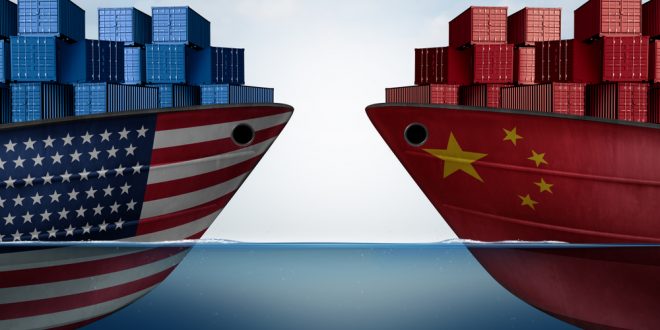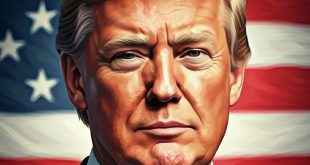The ongoing trade war between the United States and China represents one of the most significant economic confrontations of the 21st century, deeply impacting global markets, supply chains, and international relations. As the world’s two largest economies clash over tariffs, trade deficits, and technology transfers, Europe finds itself in a pivotal position, influencing and being influenced by the unfolding economic drama.
The rivalry between the West, including Europe, North America, and Oceania, and China spans economic, technological, geopolitical, and ideological fields. Each aspect of this multifaceted competition underscores the need for Western powers to continually evolve their strategies to maintain their global influence and safeguard their interests.
Economic Competition
Economically, the United States and the European Union employ various trade policies, tariffs, and negotiations to counterbalance China’s growing economic influence. Concerns over unfair trade practices, market access restrictions, and intellectual property rights violations drive these measures. The ongoing U.S.-China trade war, which began in earnest in 2018 and saw a “Phase One” trade deal in 2020, has significantly reshaped global supply chains. Companies, particularly in the technology and manufacturing sectors, are diversifying their supply sources to mitigate the impact of tariffs and trade uncertainties, leading to a reconfiguration of production networks worldwide.
Technological Advancements
On the technological front, both the U.S. and China are making significant strides. The West focuses on enhancing its capabilities in areas like artificial intelligence (AI) and cybersecurity, while China advances in biotechnology and semiconductor manufacturing. This technological rivalry is marked by substantial investments in research and development (R&D) and a relentless pursuit of innovation. President Biden’s executive order in August 2023, which banned certain U.S. tech investments in China, exemplifies the strategic efforts to curb China’s technological ascent and protect critical industries .
Geopolitical Measures
Geopolitically, the West has implemented measures to protect intellectual property and control technology exports. The CHIPS Act in the U.S. underscores the strategic importance of semiconductors in this competition. Simultaneously, increasing Chinese investments in Europe have sparked scrutiny and concern. In 2022, the UK, Germany, Italy, and Denmark collectively raised objections to over 60 percent of Chinese investment deals, reflecting growing apprehensions about national security and economic control . These actions illustrate how economic considerations are deeply intertwined with geopolitical strategies.
Ideological Conflict
Ideologically, the West and China are in stark contrast. The West champions democratic values, human rights, and individual freedoms, while China adheres to an authoritarian regime. This ideological divide fuels the broader competition, influencing diplomatic relations and international policies.
China’s Economic Development and Global Influence
China’s economic development over the past three decades, driven by robust capital investment policies, has positioned it as a formidable force in the global economy. Its increasing engagement with the Global South through initiatives like the Belt and Road Initiative is reshaping international relations. These efforts create political opposition and highlight the different approaches the West and China take in their global engagements. Western nations are continuously adapting their strategies to effectively address the multifaceted challenges posed by China’s economic and political maneuvers .
The Trade War: Impacts and Repercussions
The U.S.-China trade war has prompted significant shifts in global economic dynammics. While the initial tensions began in 2018, the complexities of the trade relationship between China and the U.S. continue to evolve. One notable consequence is the recalibration of global supply chains, with firms seeking to diversify their supply sources to mitigate the impact of tariffs and trade uncertainties. This shift affects not only U.S. and Chinese businesses but also those in other countries, leading to a global reconfiguration of production networks.
The trade war has also led to a reassessment of economic interdependence. Countries worldwide are navigating the delicate balance of maintaining economic ties with both the U.S. and China while avoiding entanglements in geopolitical tensions. The ongoing dialogue between these economic giants influences investor confidence, with businesses closely monitoring trade negotiations and policy developments for potential market impacts.
Europe’s Response to Chinese Investments
Chinese investments in Europe, particularly in infrastructure and technology sectors, have come under increasing scrutiny. European countries are concerned about the implications of increased Chinese capital, particularly regarding national security and economic control. Stricter scrteening mechanisms and regulations are being implemented to assess the impact of Chinese investments on national security and strategic interests. This scrutiny reflects a broader trend of Western nations reevaluating their economic relationships with China in light of geopolitical considerations.
The CHIPS Act and Its Strategic Importance
The U.S. government’s enactment of the CHIPS Act (Creating Helpful Incentives to Produce Semiconductors) highlights the critical role of semiconductors in modern technology and the vulnerabilities exposed during the 2020 semiconductor shortage. The shortage, exacerbated by the COVID-19 pandemic, particularly impacted industries like automotive and electronics, revealing the extent of U.S. reliance on semiconductor manufacturing in China and Taiwan. The CHIPS Act aims to reduce this dependency, bolster the U.S. semiconductor industry, and enhance national security and economic resilience.
In response to the ongoing U.S.-China trade war, Western nations, led by the United States, are implementing comprehensive strategies to safeguard their economic interests and technological advantages. Measures include imposing tariffs on Chinese goods, discouraging American companies from establishing manufacturing sites in China, and employing counterintelligence tactics to protect intellectual property. Furthermore, the U.S. actively propmotes innovation in critical industries such as biotechnology to enhance competitiveness.
President Joe Biden’s 2023 executive order intensifies regulations on technology exports to China, particularly those with potential military applications. Chinese President Xi Jinping’s projection that China will economically surpass the U.S. within a century underscores the magnitude of the economic competition, urging Western powers to evolve strategically .
This multifaceted approach signifies a shift in global dynamics, with Western nations compelled to formulate careful and innovative strategies to maintain influence over China. The competitive landscape demands resilience and adaptability as the U.S. prioritizes protecting its interests closer to home. Navigating the complex trade dispute and securing a prominent position in the face of China’s economic ambitions require meticulous planning and creative solutions.
 Noor Trends News, Technical Analysis, Educational Tools and Recommendations
Noor Trends News, Technical Analysis, Educational Tools and Recommendations





